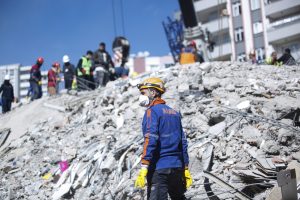Millions of refugees are at death’s door after last month’s devastating earthquakes in Northwest Syria and Turkey. Japan is in a special position to help.
Japan can help because of its position on the United Nations Security Council, through which it can push for more aid to Syria. To do that, Japan can provide what the world direly needs these days – a nation that fights for what is right.
Japan recently had such an inspiration. As tough as nails, Ogata Sadako was her name and she happened to be the first woman to ever hold the position of U.N. High Commissioner for Refugees (UNHCR), serving from 1991 to 2000.
Famously short in stature, Ogata was gigantic in her ability to confront the chaos unleashed during her term, which began just as the Cold War ended. She never shied from confrontation.
Known to be fearless, Ogata defied warlords to help starving children, frequently visiting the world’s most dangerous places to improve conditions for refugees in Rwanda, the Balkans, Iraq, and Afghanistan.
People who dealt with her say that Ogata’s fearlessness, coupled with her mild manner, allowed her to protect those she knew were defenseless by stretching the UNHCR’s powers beyond the U.N., transcending its dry procedure with powerful moral injunctions. The evidence is clear.
While much of the world is suffering right now, millions of defenseless people in Northwest Syria are amongst those who need Ogata’s spirit and inspiration the most.
Early February’s 7.8 magnitude earthquake and its aftershocks – one of this century’s worst natural disasters – killed almost 46,000 people in Turkey, and more than 7,000 in Syria.
According to the U.N., more than 8,700 remain injured in Syria, a country already ruined by 12 years of brutal conflict imposed by President Bashar al-Assad’s war policies. Before the deadly quake, 15.3 million people, or 70 percent of Syria’s population, needed some form of humanitarian assistance because of the conflict.
Today in the earthquake zone, four to five families are packed into single tents, the risk of cholera is growing, food prices are skyrocketing, and women and children face increased harassment.
This is where Japan can really help. While Assad does not run the region hardest hit by the quake, he still controls the majority of the country and has been able to bend the U.N. Security Council to his evil will.
Several days after the disaster, Assad gave the U.N. access to only two border crossings with Turkey, slowing the humanitarian response. Critical time to save lives of those under the rubble was lost, adding to the list of atrocities committed by this regime.
Prior to the quake, Assad also spent years stealing aid intended for those in need, “systematically diverting tens of millions a year,” according to the Center for Strategic and International Studies.
Until 2024, Japan is a non-permanent member of the U.N. Security Council. Swayed by Moscow and Beijing’s influence, the council has failed the Syrian people for years, especially by ignoring the atrocities committed by Assad and Russian President Vladimir Putin in the country. It was in Syria that Putin perfected the tactics he is now using in Ukraine.
I am a Syrian Doctor living in the United States, advocating for refugees and promoting democracy in my country of birth. While I never met Ms. Ogata, who died in 2019, I know people who did. They say one could never forget the steely look in her eyes.
The people of Japan also have both the intimate knowledge of the horrors that earthquakes can unleash and the compassion, conviction, and resources needed to recover.
Japanese Prime Minister Kishida Fumio has shown great leadership in his career in diplomacy and public policy. Previous to leading the country, he was Japan’s longest-serving foreign minister. Today, Ishikane Kimihiro is his ambassador to the U.N. and sits on the Security Council when it convenes. We know both men are committed to doing what is right and using Japan’s seat on the Council as a force for good in the world.
Honesty is lonely without courage. Ogata had both and would have used her presence at the U.N. to stand up to Assad and Putin and help millions of Syrians in need. We are confident that her spirit will inspire Mr. Kishida and Mr. Ishikane to do the same.

































